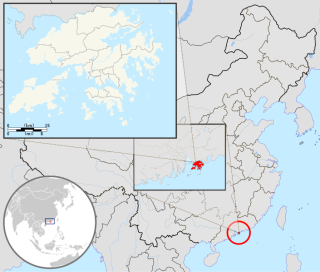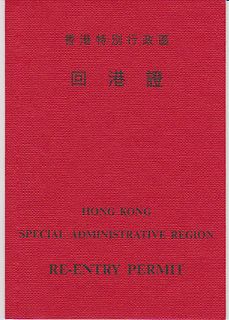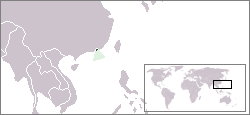Certificate may refer to:

Education in Hong Kong is largely modelled on that of the United Kingdom, particularly the English system. It is overseen by the Education Bureau and the Social Welfare Department.

Hong Kong English is a variety of the English language native to Hong Kong. The variant is either a learner interlanguage or emergent variant, primarily a result of Hong Kong's British overseas territory history and the influence of native Hong Kong Cantonese speakers.

Hongkong Post is a government department of Hong Kong responsible for postal services, though operated as a trading fund. Founded in 1841, it was known as Postal Department or Post Office before the handover of Hong Kong in 1997. It has been a sub-member of the Universal Postal Union since 1877, and is a separate entity from China Post.

A certificate of identity, sometimes called an alien's passport, is a travel document issued by a country to non-citizens residing within their borders who are stateless persons or otherwise unable to obtain a passport from their state of nationality. Some states also issue certificates of identity to their own citizens as a form of emergency passport or otherwise in lieu of a passport. The visa requirements of certificates of identity may be different from those of regular passports.
A linked exchange rate system is a type of exchange rate regime that pegs the exchange rate of one currency to another. It is the exchange rate system implemented in Hong Kong to stabilise the exchange rate between the Hong Kong dollar (HKD) and the United States dollar (USD). The Macao pataca (MOP) is similarly linked to the Hong Kong dollar.

The Hong Kong Certificate of Identity (CI) was a formal travel document and passport, issued by the Hong Kong Government's Immigration Department until 30 June 1997. It is no longer possible to possess a valid CI as a travel document, as all CIs have expired by 30 June 2007, though most CI holders should be eligible to hold the HKSAR Passport.

The Hong Kong Special Administrative Region of the People's Republic of China passport is a passport issued only to permanent residents of Hong Kong who also hold Chinese citizenship. In accordance with the Basic Law of the Hong Kong Special Administrative Region, since the transfer of sovereignty on 1 July 1997, the passport has been issued by the Immigration Department of the Government of Hong Kong under the authorisation of the Central People's Government of the People's Republic of China. As the official languages of Hong Kong are Chinese and English, the passport is printed bilingually in both Chinese and English.

The Immigration Department of the Government of Hong Kong is responsible for immigration control of Hong Kong. After the People's Republic of China assumed sovereignty of the territory in July 1997, Hong Kong's immigration system remained largely unchanged from its British predecessor model. Residents from mainland China do not have the right of abode in Hong Kong, nor can they enter the territory freely, both before and after 1997. There are different regulations that apply to residents of Macau, another Special Administrative Region of China. In addition, visa-free entry acceptance regulations into Hong Kong for passport holders of some 170 countries remain unchanged before and after 1997.

The Hong Kong Special Administrative Region Document of Identity for Visa Purposes is a biometric travel document issued by the Hong Kong Immigration Department to residents of Hong Kong who are unable to obtain a national passport. It is usually valid for seven years.

Hong Kong Re-entry Permit are issued to Hong Kong residents by the Hong Kong Special Administrative Region (HKSAR) for travel to mainland China and Macau Special Administrative Region.

The Hong Kong identity card is an official identity document issued by the Immigration Department of Hong Kong. According to the Registration of Persons Ordinance, all residents of age 11 or above who are living in Hong Kong for longer than 180 days must, within 30 days of either reaching the age of 11 or arriving in Hong Kong, register for an HKID. HKIDs contain amongst others the name of the bearer in English, and if applicable in Chinese. The HKID does not expire for the duration of residency in Hong Kong.

A travel document is an identity document issued by a government or international entity pursuant to international agreements to enable individuals to clear border control measures. Travel documents usually assure other governments that the bearer may return to the issuing country, and are often issued in booklet form to allow other governments to place visas as well as entry and exit stamps into them. The most common travel document is a passport, which usually gives the bearer more privileges like visa-free access to certain countries. While passports issued by governments are the most common variety of travel document, many states and international organisations issue other varieties of travel documents that the holder to travel internationally to countries that recognise the documents. For example, stateless persons are not normally issued a national passport, but may be able to obtain a refugee travel document or the earlier "Nansen passport" which enables them to travel to countries which recognise the document, and sometimes to return to the issuing country.

The Hong Kong General Chamber of Commerce was founded on 29 May 1861, and is the oldest and one of the largest business organizations in Hong Kong. It has around 4,000 corporate members, who combined employ around one-third of Hong Kong's workforce. It is a self-funding, not-for-profit organization that promotes and represents the interests of the Hong Kong business community. A core function of its work is to formulate recommendations on improving the business environment, which its 23 industry-specific committees constantly analyze and make regular submissions to HKSAR Government officials and policy makers.

The visa policy of Hong Kong deals with the requirements in which a foreign national wishing to enter Hong Kong through one of the 15 immigration control points must meet to obtain an entry permit or Visa, which depending on the traveller's nationality, may be required to travel to, enter, and remain in the Hong Kong Special Administrative Region. Visitors from over 145 countries are permitted without Visa entry for periods ranging from 7 to 180 days, to the Hong Kong Special Administrative Region for tourism or certain business-related activities. All visitors must hold a passport valid for more than 1 month.

The Macau Resident Identity Card or BIR is an official identity card issued by the Identification Services Bureau of Macau. There are two types of Resident Identity Cards: one for permanent residents and one for non-permanent residents.

Hongkongers, also known as Hong Kongers, Hong Kongese, Hongkongese, Hong Kong citizen and Hong Kong people, typically refers to legal residents of the city of Hong Kong; although may also refer to others who were born and/or raised in the city.

Lesbian, gay, bisexual, transgender (LGBT) persons in Hong Kong, which is a special administrative region of China, may face legal challenges not experienced by non-LGBT residents.

The British National (Overseas) passport, commonly referred to as the BN(O) passport, is a British passport for persons with British National (Overseas) citizenship. BN(O) citizenship was created in 1987 after the enactment of Hong Kong Act 1985. BN(O) citizens are permanent residents of Hong Kong who were British Dependent Territories citizens until 30 June 1997, and chose to remain British by registering for BN(O) citizenship when Hong Kong was under British administration.















